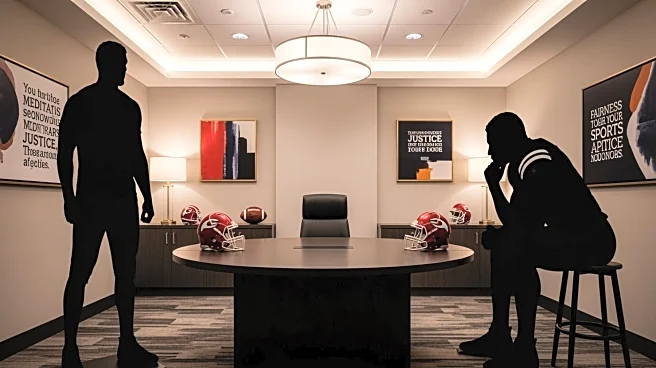What's Happening?
Former Green Bay Packers wide receiver Jordy Nelson has taken on a new role as a joint hearing officer for the NFL and NFLPA, where he mediates appeals related to suspensions and fines. Recently, Nelson was
involved in the appeal process for Detroit Lions safety Brian Branch, who was suspended for throwing punches after a game against the Kansas City Chiefs. The initial ruling by NFL vice president of football operations, Jon Runyan Sr., highlighted the aggressive nature of Branch's actions, which were deemed unwarranted and a violation of NFL conduct standards. Nelson's role involves reviewing such cases and providing a fair hearing between the league and the players' union.
Why It's Important?
Nelson's involvement in the appeals process underscores the NFL's commitment to maintaining sportsmanship and safety standards. By appointing former players like Nelson, the league ensures that the appeals process is informed by individuals with firsthand experience in the sport. This development is significant for players and teams as it provides a structured avenue for contesting disciplinary actions, potentially impacting team rosters and player availability. The outcome of such appeals can influence team strategies and player careers, highlighting the importance of fair and transparent mediation in professional sports.
What's Next?
As Nelson continues in his role, the NFL and NFLPA may see more appeals being processed with a focus on fairness and player representation. The decision on Branch's appeal will set a precedent for future cases, potentially affecting how players approach disciplinary actions. Teams and players will be closely monitoring the outcomes of such appeals to understand the implications for conduct and discipline in the league. The ongoing collaboration between the NFL and NFLPA in this area may lead to further refinements in the appeals process.
Beyond the Headlines
Nelson's transition from player to mediator reflects a broader trend of athletes taking on roles within sports governance, leveraging their experience to influence policy and decision-making. This shift can lead to more player-centric approaches in league operations, fostering a culture of mutual respect and understanding between players and management. Additionally, the emphasis on sportsmanship and conduct in the NFL may inspire similar initiatives in other sports leagues, promoting ethical behavior across professional sports.









